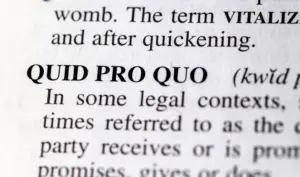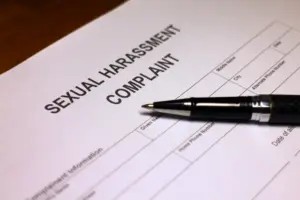Experiencing sexual harassment in the workplace can be deeply distressing and unfair. No one should feel unsafe or even disrespected where they work. California law recognizes this, which is why most employers are legally required to step in to take meaningful action to prohibit such behavior. Under the Fair Employment and Housing Act (FEHA), they must ” take all reasonable steps to prevent harassment from occurring” (Gov.C. § 12940(k)).
If you were a target of sexual harassment at work, please know that you have rights and options to pursue justice. You may be eligible for compensation for any losses you incurred, like lost wages and emotional distress. More importantly, knowing your legal protections, how to detect harassment, and the steps to build your case can help you start the recovery process and reclaim your sense of safety at work.
At West Coast Employment Lawyers, we are determined to help survivors hold employers accountable for failing to prevent or address such misconduct, whether they caused it or did not take action against the perpetrators. Our legal team can navigate you through each stage of the legal process, from acquiring evidence and submitting claims in a timely manner to ensure you get the compensation and closure you deserve
To set up a FREE consultation, you can reach out to us by calling 213-927-3700 or completing our convenient online contact form.
What Is Sexual Harassment?

Sexual harassment is a form of unlawful discrimination that involves unwelcome sexual advances, requests for sexual favors, or other verbal or physical harassment of a sexual nature. This includes offensive comments, suggestive remarks, and inappropriate jokes directed at individuals based on their gender. It can occur in any setting, such as the workplace, schools, or online, and can be perpetrated by anyone, regardless of their position or relationship to the victim.
Sexual harassment is a serious issue that can have severe consequences for the affected individual, including emotional distress, physical harm, and damage done to their reputation and career. It is essential to understand sexual harassment, its forms, and its consequences to prevent it and create a safe and respectful environment for everyone.
What Constitutes As Sexual Harassment In California?
Sexual harassment in the workplace is not always easy to objectively identify. The difference between friendliness and inappropriateness can be interpreted in another way for each person. Fortunately, there are clear signs of true offensive behavior, as well as protections in place to combat it. According to the Equal Employment Opportunity Commission (EEOC), such behavior includes unwanted sexual advances, requests or demands for sexual favors, and many other forms of sexually suggestive verbal or physical behaviors.
However, sexual harassment does not necessarily have to explicitly be of a sexual nature. It’s important to understand that this type of harassment includes offensive comments about a person’s sex, whether they are male or female.
In order for sexual harassment to cross the line into unlawful territory, it must be severe or frequent enough that it results in an adverse employment decision or serves to cultivate a hostile work environment for its victims.
What Is Quid Pro Quo Sexual Harassment?
Quid pro quo sexual harassment is a form of workplace harassment that happens when sexual advances are tied to employment decisions. It often involves a supervisor, manager, or other individuals in authority offering benefits, like a promotion or raise, in exchange for sexual favors. If the individual refuses, they may endure negative consequences (termination or demotion).
This form of harassment establishes a direct link with sexual compliance and employment outcomes, making it illegal under Title VII of the Civil Rights Act. Unlike hostile work environment harassment, which involves pervasive unwelcome conduct, quid quo pro harassment is deemed transactional and is associated with tangible workplace benefits or penalties.
What Laws Protect Me From Sexual Harassment at Work?
There are federal and state laws set in place to protect you from sexual harassment at work, which is illegal whether the perpetrator is a supervisor, a coworker, or even a customer or client you may be doing business with.
State Law
In California, the FEHA exists to prohibit all forms of sexual harassment in the workplace. Such protections may apply to:
- Employment agencies
- Private employers
- Public employers
- Labor organizations
Preventing sexual harassment is crucial under California law, which emphasizes proactive measures to foster a safe and compliant organizational environment.
Federal Law
The primary federal law that prohibits all forms of sexual harassment in the workplace is Title VII of the 1964 Civil Rights Act (Title VII). Much like FEHA, Title VII applies to:
- Federal government
- Employment agencies
- Labor organizations
- Private, state, and local government employers with 15 or more employees
Harassment will be prohibited in all aspects of employment, including hiring, firing, compensation, promotion, training and other terms and conditions. It is also unlawful to punish or retaliate against someone who is filing a harassment complaint or participating in an investigation.
What Are the Consequences of Harassing Behavior in the Workplace?
Sexually harassing behavior in the workplace can consist of serious consequences for each person involved. For the perpetrator, it can turn into disciplinary action, including warnings, suspensions, or even termination. Such conduct can also inflict damage to their professional reputation and career.
Victims may suffer emotional and psychological trauma, like stress, anxiety, and depression. They could also be met with setbacks in terms of their career because of the hostile work environment. Organizations could also be held responsible if they did not address the problem, ultimately facing costly lawsuits, fines, and damage done to their reputation as a whole. In addition, harassment can lessen overall employee morale, reduce productivity, and increase turnover, thus establishing a toxic work environment that can affect everyone.
Who Do I Report Sexual Harassment to?
If you experience sexual harassment in the workplace, it is important to remember that you are not alone and it is not your fault. Reporting what happened can feel overwhelming. But, there are individuals and organizations who are ready to listen to you, give you support, and guide you through the process.
If the incident happened while you were working, you can start by speaking to your supervisor, manager, or the human resources (HR) department. However, if the individual harassing you happens to be your supervisor, or use any anonymous reporting system available to you.
Employers need to address these cases appropriately, and if they choose not to take your concerns into account, or if you prefer to go outside your work facility, you are entitled to file a complaint with the EEOC or the California Civil Rights Department (CRD). They will look into your situation and protect your rights.
Harassment that involves physical assault or any form of violation should be reported to your local law enforcement. For confidential support, you can reach out to the National Sexual Assault Hotline at 1-800-656-4673 or RAINN.org. Trained professionals will be readily available to hear your story, give you guidance, and connect you with local resources.
What Are the Outcomes of Harassment?
The possible outcomes of a sexual harassment complaint can vary depending on the circumstances of the case. Under some circumstances, the harasser may be disciplined or terminated, while in other instances, the employer may be required to provide counseling or other forms of assistance to the victim. The affected individual may also be entitled to compensation or damages for any harm or losses suffered as a result of the harassment. In addition, the employer may be required to implement changes to policies and procedures to prevent future incidents of sexual harassment.
It is essential to have a clear understanding of the possible outcomes of a sexual harassment complaint to ensure that victims receive the support and assistance they need.
How to Deal with Verbal Harassment?
Dealing with verbal harassment can be challenging, along with it being emotionally draining. However, there are steps you can take to defend yourself and have the situation addressed properly.
- First, you will need to trust your instincts. If a person is making you feel uncomfortable or disrespected with their words, it is important to recognize that it is unwelcome verbal communication, and such behavior is not acceptable. When safe, speak up directly and let them know that their sexual comments are unwelcome, but if confronting them feels unsafe to you, you are not required to commit to this suggestion.
- Next would be to document the incident. Note down what was said to you, when communication was initiated, where it happened, and who was present at the time you were being verbally harassed. Be sure to maintain detailed records as these can be helpful if you decide to move forward with a formal complaint later on.
- After you should have it reported to your supervisor or HR department. Employers are obligated to take such complaints seriously and initiate an investigation to have the problem addressed. If the behavior persists or your complaint is ignored, you can reach out to the EEOC or CRD for further help.
- Lastly, do not hesitate to get emotional support. Telling your experience to a reliable friend, counselor, or therapist can help you cope with what you went through and allow you to regain confidence. No one deserves to endure such mistreatment, and reaching out for help is a strong and necessary step to take to ensure your safety and overall well-being.
What Is the Time Limit for Hostile Work Environment?
In California, the time limit to report a hostile work environment is usually three years from the last incident. If the harassment or hostile treatment is persistent, the clock will start from the most recent case, not the initial one. That means if such behavior is frequent over time, you may still be entitled to file as long as one of the interactions took place within the past three years.
After filing with the CRD, you can request an immediate “right-to-sue notice” if you are deciding to take legal action in court, or allow the agency to look into your case first. It is important to understand that if the conduct involves criminal acts, like physical assault or sexual violence, different statutes may apply.
Certain serious sexual offenses will typically have no statute of limitations (Penal Code 799), meaning they can be prosecuted at any given time regardless of when the crime was initiated. This applies to cases that happened on or after January 1, 2017, and to crimes for which the statute of limitations was in effect before that date has not expired.
These include forcible rape (Penal Code 261) and sexual penetration by foreign object (Penal Code 289). If the victim was a minor at the time of the offense, the statute of limitations may be extended. Prosecution can commence until the victim’s 40th birthday depending on the specific factors and nature of the situation (Penal Code 801.1).
These offenses are considered so severe that the law allows affected individuals to pursue legal action at any time, reflecting California’s commitment to hold the perpetrators accountable regardless of how much time has passed.
What Qualifies as Employee Retaliation?
Employee retaliation happens when an employer takes adverse action against an employee for participating in a protected activity, like reporting harassment or discrimination in the workplace. Retaliation is illegal under federal (Title VII) and state law (FEHA). Some examples include the following:
- Termination after filing a harassment complaint
- Pay cuts as a form of punishment for speaking up
- Unfavorable shift adjustments to less desirable duties
- Exclusions from workplace activities
- Negative performance reviews without proper justification
- Harassment following a protected report
In addition, employers should provide meaningful support and resources to affected individuals. This includes counseling, legal assistance, and a transparent complaint process. It is also important that all employees are notified of their rights and responsibilities in regards to sexual harassment, including how to report concerns and what protections are set in place. By providing a safe and supportive environment, employers can encourage victims to come forward and report sexual harassment without fear of retaliation.
How Can a Bystander Interrupt a Harassment Situation?
Bystander intervention is a critical component of interrupting and addressing sexual harassment. Employers can provide training and education for this particular matter, including how to recognize and respond to sexual harassment. Bystanders can take various steps to intervene, including speaking out against sexual harassment, supporting victims, and reporting incidents to authorities. With that in mind, bystanders should do the following to interrupt sexual harassment:
- Assess the situation for safety and be sure that you and the person being targeted are not in any immediate danger before you take action. Your intervention should always prioritize safety and avoid any escalation.
- Direct intervention is the fastest and most direct to stop sexual harassment. This involves speaking to the harasser and letting them know that what they are doing is unacceptable.
- Distraction can interrupt the situation as well, like changing the subject or creating some sort of diversion.
- Delegating is another choice, in which a manager or security personnel will involve themselves in the situation to help the affected individual.
- If safe, try documenting the situation. However, the person who is being affected by such behavior should decide how or if information is shared.
- Check in with the victim. Listen without interrupting them, express your support, and let them know that what happened to them was not their fault. Ask them if they need any help, whether it is to walk with them, help them with the reporting process, or provide emotional support.
How to Recover After Being Harassed?
Recovering after being harassed can be challenging, but taking steps to care for yourself and seek support is important for you to heal and regain your confidence. First, acknowledge your feelings. Experiencing harassment can bring up so many emotions, like anger, fear, or confusion. It is critical to acknowledge that these reactions are valid. Avoid blaming yourself, and know that the harassment is never your fault.
Next, you should seek support from people you trust. This may include friends, family, colleagues, or even mentors who will listen to you without any judgement. Professional help from counselors, therapists, or support groups, can provide tools for coping with emotional distress and rebuilding your sense of safety.
Documenting the situation is effective, as well, both for your own clarity and if you decide to report your experience to a high authority in the workplace. Knowing your legal rights and employment policies can help you feel more empowered. Lastly, prioritize self-care and personal boundaries. Participate in activities that may bring you a sense of comfort and help protect your well-being. Remember, this is a personal process, and seeking help is a sign of strength, not weakness.
West Coast Employment Lawyers Stand with You
Experiencing sexual harassment can feel isolating, but you do not have to go through it alone. At West Coast Employment Lawyers, our skilled attorneys are here to listen to your concerns, provide emotional support, and guide you through the legal process. We understand the emotional toll that harassment can take on a person and are devoted to advocate on your behalf to help you seek justice.
Our team offers personalized support tailored to your unique situation. Whether you need help filing a sexual harassment claim or representation in court, we will make sure your voice is herd and that your concerns are taken seriously.
You deserve to feel safe and respected. Let us help guide you with care and confidence. We are readily available, and can be reached for a FREE consultation by calling 213-927-3700 or completing our quick online contact form.
Frequently Asked Questions About Sexual Harassment
Can Males Get Sexually Harassed?
Sexual harassment can happen to both men and women. According to data provided by the NSVRC, 81% of women and 43% of men reported experiencing some type of sexual harassment and/or assault during their lifetime.
Further research continues to show that sexual violence has affected many men across the United States. In 2024, a major survey conducted by the Newcomb Institute, in collaboration with Stop Street Harassment, ValorUS, and RALIANCE, discovered that over four in ten men had been victims of sexual harassment or sexual assault at some point in their lives. Approximately one-third of sampled men stated that they had been met with contact sexual violence, including:
- Attempted or completed rape (3.8%)
- Forced to penetrate someone (10.7%)
- Sexual coercion (10.9%)
- Unwanted sexual contact (23.3%)
Does a Person Have to Be an Employee to Claim for Sexual Harassment?
Sexual harassment may occur at any point during employment, from hiring to firing. This includes the interview process, and everything in between. Experiencing sexual harassment can have significant emotional, physical, and mental health impacts on victims. Sexual harassment is prohibited and retaliating against an employee who complains about or who participates in a sexual harassment investigation is also unlawful. This means that an employee who has been fired for complaining about sexual harassment may have a claim, whether he or she is employed or not.
What Is the Difference Between Sexual Harassment and Sexual Assault?
The difference between sexual harassment and sexual assault will fall in the nature and severity of the behavior. Sexual harassment includes unwelcome sexual advances, comments, gestures, jokes, or conduct that contributes to a hostile work environment. This can happen in the workplace or in an educational setting. It is demonstrated verbally, physically, or visually, and does not have to involve physical contact. Sexual assault, on the other hand, is any non-consensual sexual act or physical interaction, like unwanted touching, attempted rape, and rape, and is deemed as a criminal offense.
While these are both considered as forms of sexual misconduct, sexual assault shows a violation of personal boundaries through force or lack of consent, whereas sexual harassment primarily covers behaviors that contribute to intimidation or discrimination based on sex.
































